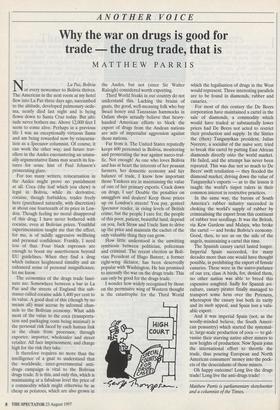ANOTHER VOICE
Why the war on drugs is good for trade — the drug trade, that is
MATTHEW PARRIS
For too many writers, reincarnation in the Andes might prove no punishment at all. Coca (the leaf which you chew) is legal in Bolivia, while its derivative, cocaine, though forbidden, trades freely here (purchased naturally, with discretion) at about one fourteenth of its price in Lon- don. Though feeling no moral disapproval of this drug, I have never bothered with cocaine, even at Bolivian prices. Youthful experimentation taught me that the effect, for me, is of mildly aggressive wellbeing and personal confidence. Frankly, I need less of that. Four black espressos are enough to boost my assertiveness beyond EU guidelines. When they find a drug which induces heightened timidity and an enhanced sense of personal insignificance, let me know.
The economics of the drugs trade fasci- nate me. Somewhere between a bar in La Paz and the streets of England this sub- stance called cocaine adds 1,400 per cent to its value. A good deal of this (though by no means all) must accrue by informal chan- nels to the Bolivian economy. What adds most of the value to the coca (transporta- tion and packaging costs being minimal) is the personal risk faced by each human link in the chain from processor, through exporter, importer, wholesaler and street retailer. All face imprisonment, and charge high for the risk they take.
It therefore requires no more than the intelligence of a gnat to understand that the worldwide, inter-governmental anti- drugs campaign is vital to the Bolivian drugs trade. It is this, and only this, which is maintaining at a fabulous level the price of a commodity which might otherwise be as cheap as potatoes, which are also grown in the Andes, but not (since Sir Walter Raleigh) considered worth exporting.
Third World freaks in our country do not understand this. Lacking the brains of gnats, the good, well-meaning folk who buy Swazi honey and Tanzanian hammocks in Oxfam shops actually believe that heavy- handed American efforts to block the export of drugs from the Andean nations are acts of imperialist aggression against those nations.
Far from it. The United States reputedly keeps 600 personnel in Bolivia, monitoring and prosecuting the war against narco-traf- fic. Not enough! As one who loves Bolivia and has at heart the interests of her peasant farmers, her domestic economy and her balance of trade, I know how important those Yankees are in maintaining the value of one of her primary exports. Crack down on drugs, I say! Double the penalties on smugglers and dealers! Keep those prices up on London's streets! You pay, genteel Spectator reader, in rising levels of British crime; but the people I care for, the people of this poor, patient, beautiful land, depend on you, Jack Straw and Uncle Sam to drive up the price and maintain the cachet of the only valuable thing they can grow.
How little understood is the unwitting symbiosis between politician, policeman and criminal. The recent election as Boli- vian President of Hugo Banzer, a former right-wing dictator, has been deservedly popular with Washington. He has promised to intensify the war on the drugs trade. This can only be good for the drugs trade.
I wonder how widely recognised by those on the permissive wing of Western thought is the catastrophe for the Third World which the legalisation of drugs in the West would represent. Three interesting parallels are to be found in diamonds, rubber and canaries.
For most of this century the De Beers corporation have maintained a cartel in the sale of diamonds, a commodity which would have traded at substantially lower prices had De Beers not acted to restrict their production and supply. In the Sixties the (then) Tanganyikan president, Julius Nyerere, a socialist of the naive sort, tried to break this cartel by putting East African diamonds directly onto the world market. He failed, and the attempt has never been repeated. This was due not so much to De Beers' swift retaliation — they flooded the diamond market, driving down the value of Tanganyika's exports — as to the lesson it taught the world's tinpot rulers in their common interest in restrictive practices.
In the same way, the barons of South America's rubber industry succeeded in choking the world's supply of rubber by criminalising the export from this continent of rubber tree seedlings. It was the British, via Kew Gardens and Malaya, who broke the cartel — and broke Bolivia's economy. Good, then, to see us on the side of the angels, maintaining a cartel this time.
The Spanish canary cartel lasted longer. Imperial Spain succeeded, for many decades more than one would have thought possible, in prohibiting the export of female canaries. These were in the narco-parlance of our era, class A birds, for, denied them, no other nation was able to breed this expensive songbird. Sadly for Spanish avi- culture, canary pirates finally managed to transport some hens over the Pyrenees, whereupon the canary lost both its rarity and its snob appeal, and Spain lost a valu- able export.
And it was imperial Spain (not, as the woolly-minded believe, the South Ameri- can peasantry) which started the systemat- ic, large-scale production of coca — to gal- vanise their starving native silver miners to new heights of production. Now Spain joins the international effort to throttle the trade, thus pouring European and North American consumers' money into the pock- ets of the descendants of those miners.
Oh happy outcome! Long live the drugs trade! Long live the anti-drugs trade!
Matthew Parris is parliamentary sketchwriter and a columnist of the Times.


























































 Previous page
Previous page